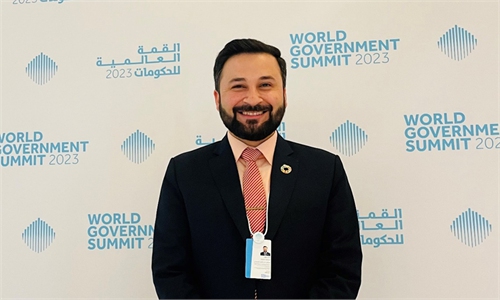
Tourists visit a glass-bottomed bridge in the Sanbai Mountain Scenic Area in East China's Jiangxi Province. Photo: VCG
Editor's Note:The two sessions, one of China's most important annual political events, is an important window for the outside world to understand China's development achievements, plans, governance philosophy, diplomatic concepts and global initiatives. Through this window, international observers closely watch China's moves and recognize China's development.
Mario Cavolo (Cavolo), CEO of M Communications Group and a senior fellow of the Center for China & Globalization, told Global Times (GT) reporters Lu Yuanzhi and Yu Jincui that unlike some Western countries with an electoral democracy, "China runs its country for the society and for the people, not for the elites, not for the billionaires, not for the corporations, not for the military industrial complex, like the US does."
This is the fifth interview of this series over the two sessions.
GT: What are your expectations for the two sessions?
Cavolo: My expectations remain positive as ever. I see China as the largest safe, stable, successful, capable, civil and peaceful country on the planet. I don't say that lightly. There are evidently observable circumstances and facts, which make it very easy to validate that statement. And the root of what China is capable of doing is its series of five-year plans, which is going to continue to develop.
I see a country with the government dealing with the problems that we have and things concerning the interests and the needs of the people. It is going to continue addressing those things like climate change. China's pollution has been improved, and the country's investment in green energy is far beyond any other. China has succeeded in overcoming poverty alleviation.
There are so many stories of China's success. It is through the five-year plans. China is in the 14th five-year plan now, and through the two sessions, I just expect this progress to continue.
GT: You made great efforts (including publishing a book) to tell the world about China's efforts and success in fighting the epidemic. Why did you do this? Why do you think China can achieve success in fighting the epidemic?
Cavolo: I understand some people don't agree with that, but their view is very tinted and biased. I know how successful China has been in handling the pandemic. But for me, one who lives here for over 20 years, I don't just see China handling the pandemic well; I see the Chinese government running the entire country well over the last two decades. They don't just execute controlling the epidemic well as they did. They are executing many aspects of building and growing their society into a great success over the years. Overall, while what I see is not perfect, the Chinese government is doing the job that it's supposed to do for the country, for the society and for the people.
GT: During the process of China's epidemic fight, what impressed you the most?
Cavolo: China's particular approach to fighting the pandemic was the most unique throughout the world. They flat out refused to open the country to expose the people to the virus in the early stages. China has likened the fight against the pandemic to a war. When you are in a war, your objective is to protect your country, protect your society, and protect your people. It was the proper and appropriate thing to do.
It was difficult in a great many ways. But the country got the best result across the world, because millions of people's lives were saved. And when you compare that to what occurred by the approach of other countries, it's incredibly admirable. The fact that China has saved what I estimate as at least several million lives is what impressed me the most.
GT: Why has the West always looked at China with tinted glasses on the issue of fighting the epidemic?
Cavolo: The reason in the case is not unique to the epidemic. The reason is just because those same critics view everything that China does through those same tinted glasses.
Whatever China does or accomplishes, it is going to be viewed and reported through those tinted glasses in a twisted and distorted way with the negative bias to the degree where it is actually not true.
The reason for this is because, primarily, China's accomplishments and achievements by comparison to theirs are an embarrassment to them. If they would allow that truth to come out, they would lose face.
China is outperforming Europe, the US, and North America. And China is doing an amazing job of working with the Global South, countries in regions such as South America and Africa.
We know all of this by the reality, by evidently observable facts. And at the same time, the West has its struggles, but we know those things are not China's fault. And we also know that China is not hostile. Instead, China is peaceful. And these are all good things for the world.
But certain Western governments, organizations and pundits do not want to hear this good story. They're just going to talk about China through those tinted glasses. It is unfortunate, because it has a very negative influence on all of mankind across the globe.
GT: China emphasizes adhering to the people-centered philosophy in its governance. How do you understand this philosophy and what inspirations could it provide to other countries?
Cavolo: There is an awful lot of confusion in the narrative now about China's governance, its philosophy, and its way of governance. It's very unfortunate, because a lot of critics of China in the West try to throw up a comparison between what they call democracy and what they call communism, or what they call socialism. And by using these labels, they are just discussing the situation in a very shallow and biased way.
In practice, in the West, it is an electoral democracy, but it does not run its government for the people. The US is officially classified by the economists now as a flawed democracy. But China is not a flawed government. In any way, China runs its country for the society and for the people, not for the elites, not for the billionaires, not for the corporations, not for the military-industrial complex, like the US does. It's very clear to me and all the other experts who are in a very large community connected with me throughout the country and lived here long-term like myself.


